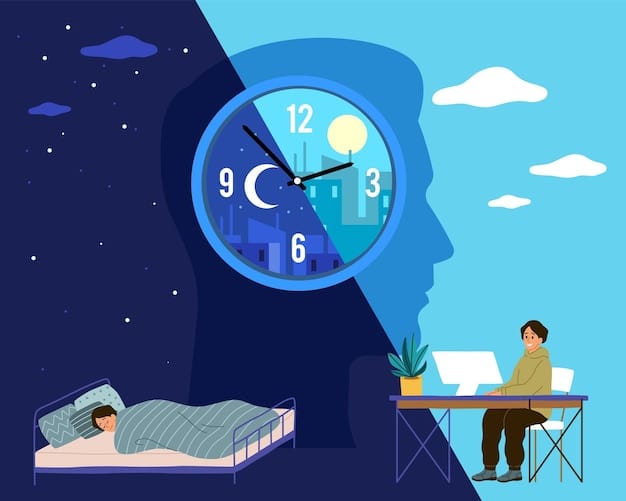Boost Productivity: The Science of Sleep Optimization

The Science of Sleep: How Optimizing Your Sleep Cycle Can Increase Productivity by 20% involves understanding sleep stages, circadian rhythms, and adopting effective sleep hygiene practices to significantly enhance cognitive function and overall performance.
Unlock your full potential by understanding the science of sleep: how optimizing your sleep cycle can increase productivity by 20%. A well-rested mind is a powerful asset, so let’s dive into the world of restorative sleep and its impact on your daily life.
Understanding the Basics of Sleep Science
Sleep isn’t just downtime; it’s an active process essential for physical and mental restoration. Let’s explore the fundamental aspects that highlight its importance.
The Stages of Sleep
Sleep occurs in distinct stages, each with unique physiological characteristics. These stages cycle multiple times throughout the night, contributing to overall rest and recovery.
- Stage 1 (NREM 1): A transitional phase between wakefulness and sleep, lasting a few minutes.
- Stage 2 (NREM 2): Characterized by deeper relaxation, slower heart rate, and decreased body temperature.
- Stage 3 (NREM 3): The deepest stage of sleep, crucial for physical recovery and hormonal regulation.
- REM Sleep: Rapid eye movement sleep, associated with dreaming and cognitive processing.
Understanding these stages helps appreciate the complexity of sleep and its impact on various bodily functions. Each stage plays a vital role in different aspects of restoration and cognitive function.
The Circadian Rhythm: Your Internal Clock
The body’s internal clock, known as the circadian rhythm, regulates sleep-wake cycles. Understanding this rhythm is crucial for optimizing sleep.
How the Circadian Rhythm Works
The circadian rhythm is influenced by external cues, such as sunlight and darkness, which help synchronize the body’s internal processes. When this rhythm is disrupted, it can lead to various health issues.
- Light Exposure: Sunlight helps regulate the circadian rhythm, signaling wakefulness.
- Melatonin: A hormone that promotes sleepiness, produced in response to darkness.
- Consistency: Maintaining a regular sleep schedule reinforces the circadian rhythm.
By aligning daily activities with the circadian rhythm, individuals can improve their sleep quality, enhancing overall health and productivity. The body functions best when it follows a consistent and predictable pattern.

Optimizing Your Sleep Environment
Creating a conducive sleep environment can significantly improve sleep quality. Consider the following factors to enhance your bedroom’s sleep-friendliness.
Factors That Impact Sleep Environment
Several elements can influence sleep quality, including temperature, noise levels, light exposure, and mattress comfort. Addressing these factors can lead to more restful nights.
- Temperature: Keep the bedroom cool, ideally between 60-67°F (15-19°C).
- Noise: Minimize noise using earplugs or white noise machines.
- Light: Ensure the room is dark by using blackout curtains or eye masks.
By making small adjustments to the sleep environment, you can greatly improve your ability to fall asleep and stay asleep throughout the night. Comfort and darkness are key factors in promoting deep sleep.
Sleep Hygiene Practices for Better Rest
Adopting healthy sleep habits, known as sleep hygiene, can promote better sleep. Here are some beneficial practices to incorporate into your routine.
Practices That Promote Better Sleep
Consistent sleep hygiene practices can regulate the sleep-wake cycle and alleviate sleep disturbances. These practices include dietary adjustments, exercise timing, and technology management.
- Consistent Schedule: Go to bed and wake up at the same time every day.
- Dietary Habits: Avoid caffeine and alcohol before bed.
- Exercise: Regular physical activity can improve sleep, but avoid intense workouts close to bedtime.
Implementing these practices can significantly impact sleep quality. Maintaining a routine and being mindful of what you consume before bed can improve the restorative effects of sleep.

The Link Between Sleep and Productivity
Adequate sleep is closely linked to enhanced productivity. Understanding this relationship emphasizes the importance of prioritizing sleep for professional and personal success.
How Sleep Affects Productivity
Sufficient sleep enhances cognitive functions such as attention, memory, and decision-making, all of which contribute to increased productivity. Conversely, sleep deprivation can impair these functions.
Chronic sleep deprivation leads to reduced cognitive function, slower reaction times, and decreased emotional stability. Over time, this can drastically affect performance in both simple and complex tasks.
Furthermore, sleep deprivation has been linked to increased errors, accidents, and reduced job satisfaction. All of these factors combined highlight how crucial sleep is for peak productivity and overall workplace success.
Strategies for Optimizing Your Sleep Cycle
Optimizing your sleep cycle involves a combination of behavioral adjustments and environmental modifications. Here are some strategies to enhance sleep quality and duration.
Tips for a Restful Night
Start by setting a consistent sleep schedule, even on weekends. Ensure your bedroom is dark, quiet, and cool. Limit screen time before bed, as the blue light emitted from devices can interfere with melatonin production.
Consider using relaxation techniques such as deep breathing exercises, meditation, or gentle yoga to calm your mind before sleep. Engage in regular physical activity, but avoid intense workouts close to bedtime. Be mindful of your diet, avoiding heavy meals, caffeine, and alcohol close to sleep.
If you find yourself unable to fall asleep after 20 minutes, get out of bed and engage in a relaxing activity until you feel tired. Over time, using these tactics and adopting a consistent routine can significantly improve the quality of your sleep cycle and your overall well-being.
| Key Point | Brief Description |
|---|---|
| 😴 Sleep Stages | Understanding NREM and REM sleep for optimal restoration. |
| ⏰ Circadian Rhythm | Aligning daily activities with your body’s natural sleep-wake cycle. |
| 🛏️ Sleep Environment | Creating a dark, quiet, and cool space for better sleep. |
| 💪 Productivity Boost | Improved cognitive functions lead to a 20% increase in productivity. |
Frequently Asked Questions
Quality sleep enhances cognitive functions like attention, memory, and decision-making, increasing productivity. Poor sleep leads to reduced concentration and efficiency, impacting your daily performance.
Improve sleep hygiene by maintaining a consistent sleep schedule, avoiding caffeine and alcohol before bed, creating a dark and quiet sleep environment, and practicing relaxation techniques, such as meditation.
The circadian rhythm is crucial for regulating sleep-wake cycles. Disruptions can lead to insomnia and other sleep disorders. Aligning your daily activities with your circadian rhythm promotes better sleep quality.
Yes, optimizing your sleep can significantly increase productivity. Research indicates that people who get adequate sleep experience enhanced focus, memory, and emotional stability, boosting their overall performance by about 20%.
Create an ideal sleep environment by ensuring your bedroom is dark, quiet, and cool. Use blackout curtains, earplugs, or a white noise machine to minimize distractions. Also, invest in a comfortable mattress.
Conclusion
Understanding and optimizing your sleep cycle is a cornerstone of enhancing productivity and overall well-being. By adopting these science-backed strategies, you can unlock your full potential and experience a more focused and effective life.





